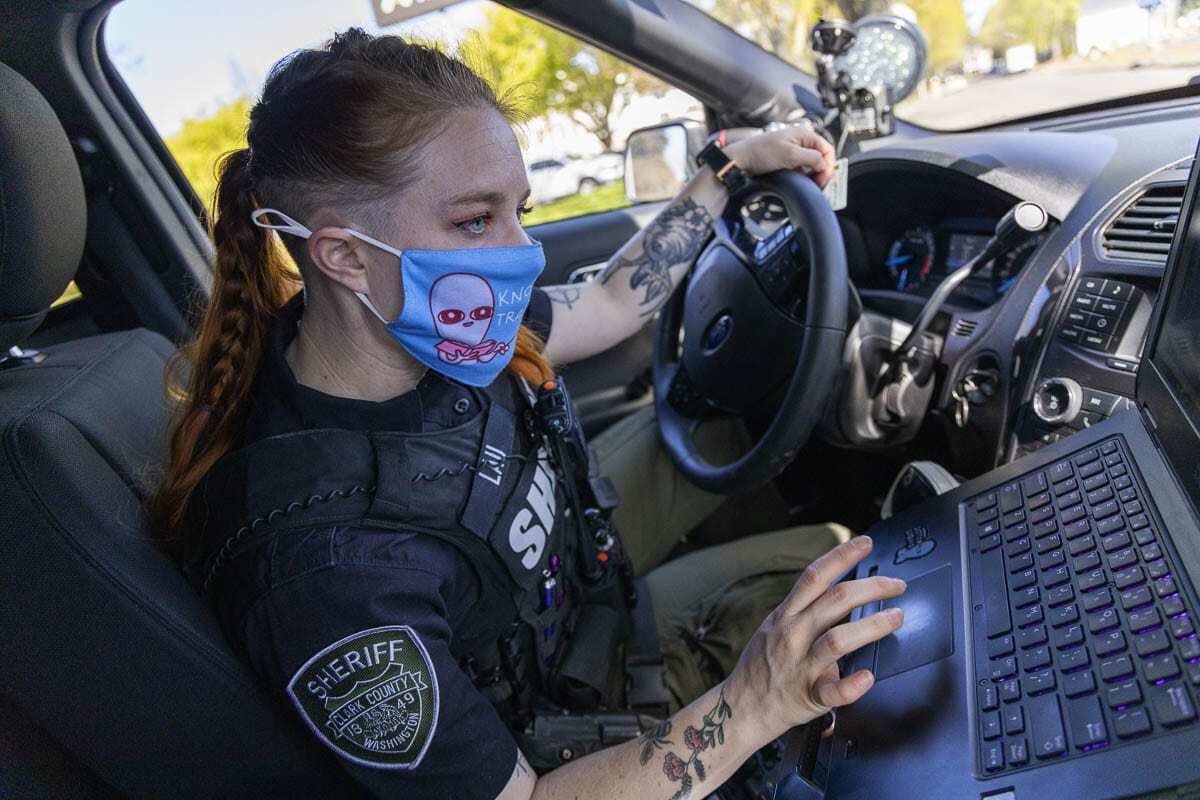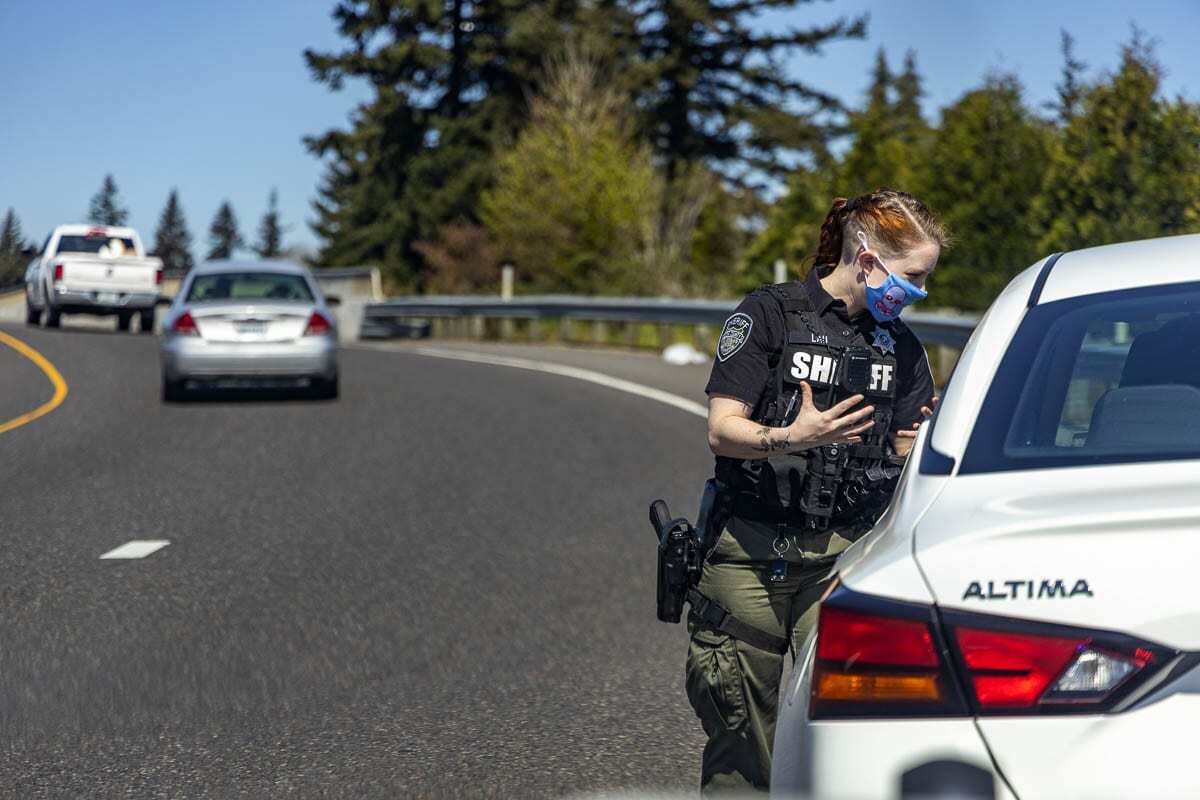The Real Why – The Target Zero Task Force is conducting a distracted enforcement of driving behavior
Education is just as important as enforcement on special traffic patrols
VANCOUVER – you’ve heard it all before. The statistics were shown and the horror stories touted. You may even have been caught and given a warning.
“Don’t drive distracted. This time I’m just giving you a warning, but you will get a quote if it happens again. “
Bethany Lau, CCSO traffic detective, conducts a traffic disruption for distracted driving during a zero goal enforcement along Mill Plain. Photo by Jacob Granneman
As you drove off, you may have felt annoyed, angry, embarrassed, embarrassed, or just simply freaked out. If you experienced any of these emotions, you are in good company. You may then come across items like this with disdain and maybe even an eyeroll.
However, there is one piece of information that such assessments may not take into account: the real primary goal of many law enforcement members is not just enforcement; It’s education.
“If I decide to overtake or stop someone, I don’t pull people over because they drive the way I would drive if I wasn’t at work,” said Bethany Lau, officer traffic detective for the Clark County sheriff . “When they drive the way I drive, I tend not to pull these people, I tend to wait and pull people when what they’re doing is egregious.”
“If what you’re doing really affects the safety of others, I stop my traffic. Then I decide: will this be resolved through education or will enforcement be needed today? “
Earlier this month, Lau and officers from several other agencies, including Vancouver and Washougal Police, participated in a distracted drive check from Target Zero. It is easy to set up: one plainclothes policeman spotters while the others wait for information as usual.
Target Zero, a program run by the Washington Traffic Safety Commission (WTSC) aimed at eliminating traffic-related deaths in Washington by 2030, is funding the additional patrols directly through the composition of the multi-agency task force.
“We are working through our leadership to find officials who are genuinely invested in road safety in our community,” said Jesamie Peters, Region 6, Target Zero manager, which includes Counties Clark and Skamania. “I wonder, and I’ve seen people wonder how many serious or fatal accidents with injuries are acceptable. And then how many are acceptable in your family? ”
“If that answer is zero, we need to work together and stick to our priorities of putting our phones down and not driving distracted or influenced so everyone can get home safely.”
 Det. Lau uses her patrol car’s computer during stops and occasionally while driving, but stated that she could only use it for official purposes; everything else and it’s distracted to drive for them too. Photo by Jacob Granneman
Det. Lau uses her patrol car’s computer during stops and occasionally while driving, but stated that she could only use it for official purposes; everything else and it’s distracted to drive for them too. Photo by Jacob Granneman
Another key element that Target Zero and many officials like Lau are quick to remind people of is that any harm is dangerous and likely illegal. Many times when a distracted drive stop is made, other heart attacks have exacerbated the situation and contributed to the subject’s noticeable impairment, such as drug use or even just eating, Lau said.
After a layover that resulted in an arrest on pending arrest warrants, the subject in custody told Lau that she would not drive high on marijuana because it made her paranoid, but that she believed that driving was manageable after drinking.
It is this kind of flawed categorization or classification that leads to a deadly culture of distraction, Lau explained. Rethinking an argument or taking methamphetamine; both can cause impairment that could result in tragedy, she said.
“If you focus too much on other things, even if you only go on in your head, you think too much, you are under the influence of something that can have significant consequences,” Lau said. “It could kill someone else, or you could seriously injure someone, all because you don’t focus on driving.”
 Often times, other violations are spotted during a distracted enforcement check, such as B. the stop shown here, which is due to the fact that the driver is not wearing a seat belt. Photo by Jacob Granneman
Often times, other violations are spotted during a distracted enforcement check, such as B. the stop shown here, which is due to the fact that the driver is not wearing a seat belt. Photo by Jacob Granneman
The implementation of Target Zero takes place every month with different priorities and the overarching goal of changing the culture with a combination of consistency and education. The mentality is similar to the original Washington state legislature introduction to penalize mobile device use while driving in 2008 and then in 2017.
Target Zero’s task force will take on drunk driving in early May with additional DUI patrols on and around Cinco de Mayo.
Reporter’s Observations:
While reporting for this story, I drove with Det. Lukewarm to get imagery, as we often do with Target Zero stories. This time, the officer I was accompanying was the one making the arrest.
This is not uncommon, even with distracted driving patrols. The story is all too often the same: the subject was texting, talking, or driving without a seat belt, and when it was run over it turned out there were arrest warrants for existing charges.
In this case the subject, a young woman, was not wearing seat belts. She had a litany of offense orders, a suspended license, and lacked the proper detonation tracking device required from a previous DUI conviction.
She had also been accused of promoting or participating in prostitution in Seattle.
I’m writing about it to indicate what’s next. After I took her into custody, Lau, I, and the subject made the long drive to Clark County Jail. A conversation was held during this trip.
I will pause here for a moment to be transparent and absolutely honest. I grew up in a family with law enforcement. I heard many stories from people who were sent to prison. Some crazy, others with notes of compassion, and some with moments that are like redemption.
The conversation between Lau and the woman in custody, who was my age and had a three-year-old son, was one of those conversations that were full of compassion, understanding, and education.
The subject in custody asked Lau questions and she answered them. Laos offered harsh advice and even tougher realities. The subject listened. Understand the subject. The subject said that other police officers wouldn’t always do this. I would say she was even grateful.
It is a challenge to find many grateful people in handcuffs.
Ultimately, I also had a brief conversation with the subject. I told her I wouldn’t use her name or her likeness. They weren’t needed for the story I was making. She thanked me too. I told her that I thought she would be fine if she saw this as a chance to fix things. She said she agreed.
I told her that I had prayed for her and that Jesus loved her. If you know me, I can’t help but tell someone this. She started crying and thanked you again. Then she went to jail.
I’m not sure if the education and compassion she received from Lau will change her decisions or if the things I have said will have an impact, but I know neither of them hurt. I suppose I am writing this because this uncomfortable and unexpected experience strangely gave me hope.
It gave me hope because I saw the real “why” of healthy, honest, unbiased, honorable, and truthful police work. The police work I grew up with. Not everyone knows the police work I know. But the police work I know is out there. And it gives me hope.
Jacob Granneman


